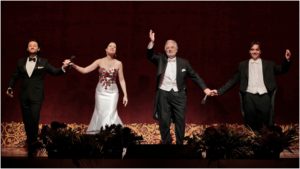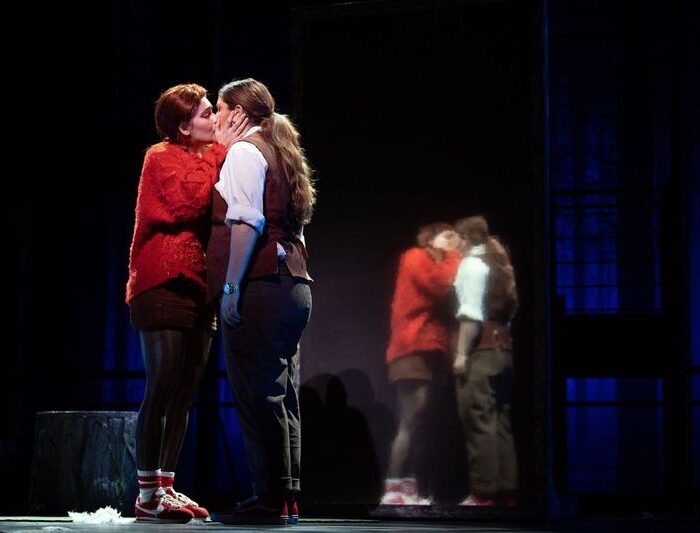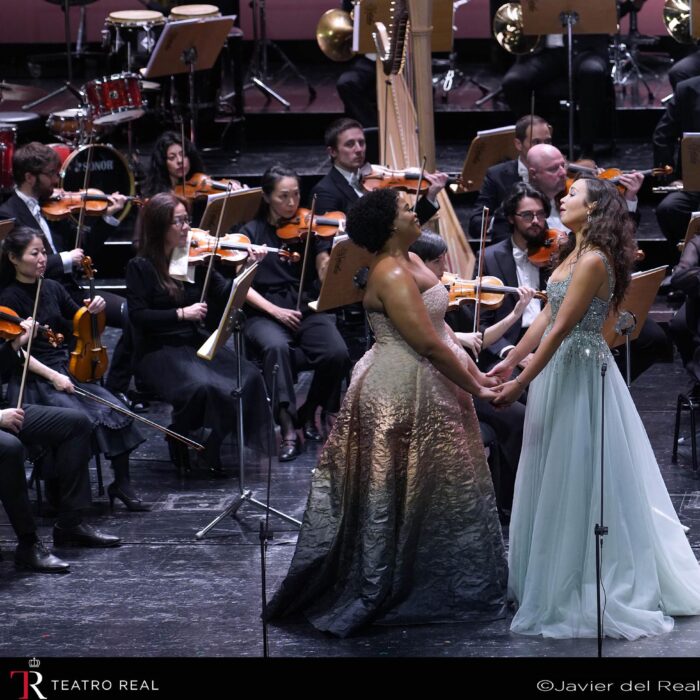
San Francisco Opera 2018-19 Review: Plácido Domingo in Concert
The Legendary Artist, Ana María Martinez & Arturo Chacón Cruz Put on Spectacular Performance
By Lois SilversteinThe last time I saw Plácido Domingo up close was the first time: “Andrea Chénier,” San Francisco, 1975. He was a dashing superstar and a tenor.
On Sunday, Oct. 21, 2018, he was General Director of the Los Angeles Opera, overseer of Operalia, The World Opera Competition, which he founded in 1993, conductor, divo, and baritone.
What also changed was dark hair to silver, bare-faced to bearded, boyish charm to suavity, and manly debonair. The man who is still Domingo is still a marvel. He proved that once again Sunday afternoon at the War Memorial Opera House, in concert, with fellow artists, Puerto Rican soprano, Ana María Martinez, and Mexican tenor, Arturo Chacón-Cruz.
La Traviata
The concert began with the Prelude of “La Traviata,” conducted by Spanish conductor, Jordi Bernacier, and the San Francisco Opera Orchestra, creating an instant long ago and far away atmosphere. Then we proceeded to Act two, Scene one, of Verdi’s Masterpiece, complete with full set, which was drawn from SFO’s recent production of “Tosca.”
Violetta appeared in a striking black and silver studded gown in her “drawing room” to encounter Germont, sung by Domingo, a role that Verdi seemed to have written for him for this point in his life. Appearing in straw fedora, grey three-piece suit and cane, he took the stage immediately with grace and presence. Although he came proud and demanding, Domingo as Germont evoked a sympathetic, caring, if righteous, father; the portrayal showed the depth and concern of any good baritone.
Any unsteadiness he evinced – some vocal wobbling at moments, some low notes subdued by the music – this seemed simply that of an old man, the character he portrayed, solid and determined. We expected so much of him, of course. But at 77, you might expect some of those technical imperfections. But, he rose to the occasion. With” De Provenza il mar del sol,” we had beauty again.
Arturo Chacón-Cruz as Alfredo, conveyed intensity with his own tenor ring. He was all the sincerity and anguish of a young man who has nothing in mind but a commitment to love and passion, regardless of his respect for his father and family.
As Violetta, Ana María Martinez was measured and precise, contained and respectful; she gave a fine performance with a feathery voice that lifted any suggestion of sordidness from the situation. Her singing, lovely and flexible, pleased in all its expressiveness, ultimately giving us a Violetta who was poignant and rich with pathos. When she asks Germont to hold her like a daughter, there is total conviction and commitment. It was as always touching.
Simon Boccanegra
The high quality of the performance continued into Act two, scenes two, three, and four of “Simon Boccanegra.”
Here Domingo sang and performed with stature, in his blue velvet cape, flaring white collar, silvery hair, and regal confidence. This father figure was commanding, proud, devoted to his daughter. He sang with heartfelt conviction, and again the voice sustained some lovely ring.
Martinez, as Amelia, was sensitive, loyal, sweet, sincere – she hit all her notes with ease, her phrasing smooth and immaculate. Her duet with Placido stayed contained and neat.
As Gabriele Adorno, Chacón-Cruz played the perfect lover and enemy. No question his whole being communicated human emotion and authenticity. The trio at the end was over-all splendid.
Zarzuela
The second half of the program was devoted to Zarzuela. Each performer took a turn, over three cycles, followed by encores.
When the orchestra began, it seemed like the outset of a festival, and as each piece proceeded, it seemed like one. Right away, Domingo sang with ease, moving smoothly from dramatic to lyric expression and back again. He brought line after line to life, the content never lacked significance. His high notes had plenty of expression and conviction; sometimes the low notes sank into the orchestra, but he never came out of character. Never did he pawn lyrics for mood. He invested himself in the particular character articulating situation with clarity. “Light of my life, be careful with my love”, and he meant it. We were convinced.
Chacón-Cruz sang with sonorousness and passion; he invested himself in each romanza, never flagging. His upper range was resonant. He moved a lot, hands, feet, body, head. Flexibility definitely pleased, but it raised a question whether it also held off some of the depth of sound.
Martinez sang her solo numbers with great charm. “De España Vengo” was sung with terrific poise; genteel flirtation never beggared words or tone. When she did her duet with Placido, Domingo he led her on stage with his arm crooked around hers. When was the last time we saw that? It was the grace and charm of another world.
Like a cat, Domingo has had many lives – the young tenor who sang with ardor and brio, richness of tone and suavity is the older baritone with panache and sometimes a sultry charm. Time has neither tamed nor dissuaded him.


